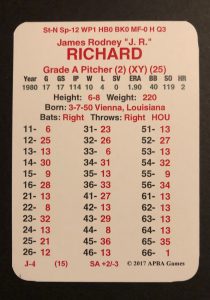The rise and fall of J.R. Richard is one of baseball’s greatest tragedies. From his humble beginnings as a high school phenom to his final games in the 1980 season, Richard was always entertaining.
James Rodney Richard was a legendary scholastic athlete in Louisiana. In his high school baseball career, he NEVER lost a game he started. Once he beat his cross-town rival 48-0…and hit four home runs to go along with his shutout. As well as baseball, J.R. was a tremendous basketball player. With his 6-8 220lb frame, he received several basketball scholarship offers. However, after being the second overall pick by the Houston Astros in the 1969 amateur draft, he decided to pursue baseball. His idol was Bob Gibson…a dominant right-hander for whom Richard had a lot in common.
After a couple of seasons in the minors, J.R. was in the big leagues to stay in 1971. His first five seasons were a struggle as he learned to harness his powerful right arm. Even in his prime, Richard would struggle with control. Three times each, he led the National League in walks and wild pitches. In 1976, J.R. began his four and a half years of dominance when he posted a 20-15 record and a 2.75 ERA.
In 1978, J.R. Richard’s dominance reached a new level. In both 1978 and 1979, Richard struck out 300+ batters and, in 1979, led the NL with a 2.71 ERA. Johnny Bench and Dale Murphy both said that Richard was the toughest pitcher they ever faced. With a fastball that often topped out about 100 MPH and a wicked 93 MPH slider, that makes sense. In 1980, Richard looked like he was on his way to another 300+ strikeout season and possibly a Cy Young Award when he suffered a career-ending stroke soon after his dominate All-Star Game performance. In July, Richard was experiencing medical issues. His arm was feeling “dead” or numb during his outings. His was having trouble seeing the catcher’s signs, and he was experiencing light-headedness. Doctors found an artery blockage in his right arm but concluded that no surgery was needed. Unfortunately, the blockage caused Richard to have a stoke on July 30, 1980, which left him partially paralyzed on the left side of his body. Surgery was performed and Richard eventually regained control of his body…but his dominate pitching days were over. He would never pitch in the Major Leagues again.
| Split | W | L | W-L% | ERA | G | GS | CG | SHO | IP | H | R | ER | HR | BB | SO | WP | BF | WHIP | SO9 | SO/W |
|---|---|---|---|---|---|---|---|---|---|---|---|---|---|---|---|---|---|---|---|---|
| 1980 Totals | 10 | 4 | .714 | 1.90 | 17 | 17 | 4 | 4 | 113.2 | 65 | 31 | 24 | 2 | 40 | 119 | 2 | 438 | 0.924 | 9.4 | 2.98 |
J.R. Richard’s final APBA card looks like an ace in his prime. Other than the A-grade and big strikeout numbers this card should produce, the first thing that jumps out is how it hits. When a pitcher has 6-6-1 line on his card, APBA rollers take notice. For the season, Richard hit .154 with a homer and two doubles, but I project this card to hit .172. J.R. was a good hitter throughout his playing days. He managed to hit ten home runs in his ten-year career. Considering that Mario Mendoza only hit four homers in the nine years he played, I’d say Richard could handle the bat.
When I think of J.R. Richard, I constantly think of what could have been. I don’t think Richard would have been a Hall of Fame pitcher (though you never know), but he certainly had a few more high-level seasons remaining in his arm. If he had stayed healthy, what would have happened in the classic 1980 NLCS that the Astros lost to the eventual World Champion Philadelphia Phillies? It’s reasonable to think J.R. would have made a difference in one game and sent the Astros to their first World Series. How about 1981? If Richard had been pitching against the Dodgers in the divisional series, Houston’s fate might have been better against another World Series-winning team. Finally, what about 1986? Would an aging Richard have made the difference in the seven-game NLCS against the New York Mets? If so, maybe Bill Buckner would have had a different fate. We will never know. In the end, J.R. Richard was a baseball comet that arrived in the late-1970s. He showed brightly for four and a half years…and then faded away into obscurity.





It was truly a shame. We can’t even imagine how good his final stats may have been had he remained healthy.
I remember the original issue gave him some grade lower than A which was the GameCo’s M.O. in those days. Was added insult to his tragic injury.
I believe I read many years ago that, for a period of time, he was homeless in the Houston area, living under an overpass???
You are correct.